 In an exclusive interview with Independent Ethos, Amat Escalante, best known for receiving the 2013 Best Director Award at the Cannes Film Festival for his recent film Heli, talks about winning that award, why his film is so controversial and violence on film, among other topics. A close collaborator with Carlos Reygadas, who also was awarded Best Director at Cannes only a year earlier, Escalante shines a light on independent filmmaking with a conscience. The director tackles one of the more important issues in his country: drug trafficking and the ills it’s surrounded by, such as corruption, power in the hands of the few and suffering.
In an exclusive interview with Independent Ethos, Amat Escalante, best known for receiving the 2013 Best Director Award at the Cannes Film Festival for his recent film Heli, talks about winning that award, why his film is so controversial and violence on film, among other topics. A close collaborator with Carlos Reygadas, who also was awarded Best Director at Cannes only a year earlier, Escalante shines a light on independent filmmaking with a conscience. The director tackles one of the more important issues in his country: drug trafficking and the ills it’s surrounded by, such as corruption, power in the hands of the few and suffering.
Although Heli is only his third full-length film, Escalante has a strong voice and a particular point of view. His take on filmmaking includes a deep faith in audience members who do not want to be told how to feel or what to think. The Mexican director shows his own perspective through a realistic style that is closer to his own life experience than what he sees on popular movies or television. He was in Los Angeles when he called Ana Morgenstern, who wrote a glowing critique of the film yesterday (read the review here). They spoke in Spanish. You can read the English transcription below.
Ana Morgenstern: How did you feel about winning the Cannes prize for best director? Were you surprised since Carlos Reygadas won the award the previous year?
Amat Escalante: Well, while being in the competition you are aware that there might be a possibility of winning, maybe one in 20 or maybe more because there are 20 movies competing and five of those get awards. So, to begin, it was quite impressive to be able to be part of the competition for the first time. When they called us the last day of the festival, telling us to go to the awards ceremony, I was very happy to hear the news that we would win something, but we didn’t know what it would be. That’s when I thought that the best director award was out of the question because Carlos, who is a close collaborator and producer in Heli, had just won the previous year. 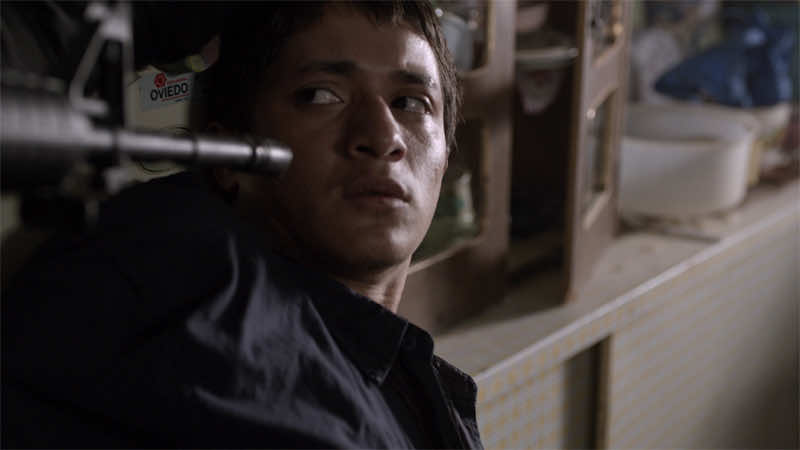 I thought to myself, it would be too unlikely to win that prize. So, winning best director was absolutely surprising. It was great for the entire team that the film was recognized with such an important award after working on it for over five years. On top of that, it was so important that Mexico won best director for two consecutive years. In that sense, the experience was very rewarding, and it has helped boost interest in the film. When it opened in Mexico, I think being recognized in the festival helped a lot, because a lot of people showed up to watch the movie, and it’s been selling well in video. It has also been sold to 35 countries. I don’t think the success is due just because of the award. I think it’s because the film tells a story that envelops the audience, and it’s a thrilling movie, but the award has certainly helped a lot.
I thought to myself, it would be too unlikely to win that prize. So, winning best director was absolutely surprising. It was great for the entire team that the film was recognized with such an important award after working on it for over five years. On top of that, it was so important that Mexico won best director for two consecutive years. In that sense, the experience was very rewarding, and it has helped boost interest in the film. When it opened in Mexico, I think being recognized in the festival helped a lot, because a lot of people showed up to watch the movie, and it’s been selling well in video. It has also been sold to 35 countries. I don’t think the success is due just because of the award. I think it’s because the film tells a story that envelops the audience, and it’s a thrilling movie, but the award has certainly helped a lot.
How have different audiences received the film?
In Cannes, the film was shown on the first day of screenings. Everybody was anxious to start watching the competing films, so being the first one meant that it grabbed lots of the attention. The audience in Cannes is mostly press; there are also industry people but mostly press. The first encounter with the press in Cannes was brusque. I think they did not understand some parts of the film, and they paid too much attention to the violent parts without seeing the love story that the film also tells. 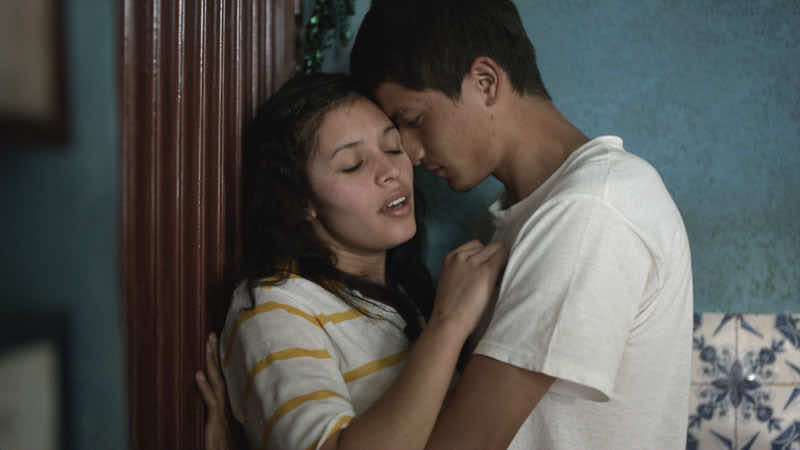 I was a little surprised by that. Later on, though, the jury, which was mostly composed by filmmakers, received the movie a lot better. They liked the film, including Steven Spielberg who said it was one of his favorite films from the past festival. He was also the president of the jury that year. In Mexico, the acceptance of the film by the public and also the critics was great for me. They understood the movie very well, and they thought it was important that a movie like that was made. We ourselves premiered and distributed the film in Mexico without the backing of millions of dollars, which is what normally happens with other commercially distributed films. Even so, a lot of people went to see the movie, and I’m very happy about that.
I was a little surprised by that. Later on, though, the jury, which was mostly composed by filmmakers, received the movie a lot better. They liked the film, including Steven Spielberg who said it was one of his favorite films from the past festival. He was also the president of the jury that year. In Mexico, the acceptance of the film by the public and also the critics was great for me. They understood the movie very well, and they thought it was important that a movie like that was made. We ourselves premiered and distributed the film in Mexico without the backing of millions of dollars, which is what normally happens with other commercially distributed films. Even so, a lot of people went to see the movie, and I’m very happy about that.
What do you think are the different reactions to your film between a Mexican and an American audience?
Paul Hudson of Outsider Pictures, who is currently distributing the film, is taking a risk because he loves the movie, and he wants people to go see it in the States. But this is a big risk to show it in theaters to American audiences. It would be easier to put it straight to DVD and TV. It’s very different, the public’s reaction in the States because when you do not live in Mexico, even if you’ve lived in Mexico or you’ve been living a few years abroad, you start to idealize the country. I think some people are embarrassed to see a situation that is taking place in Mexico. 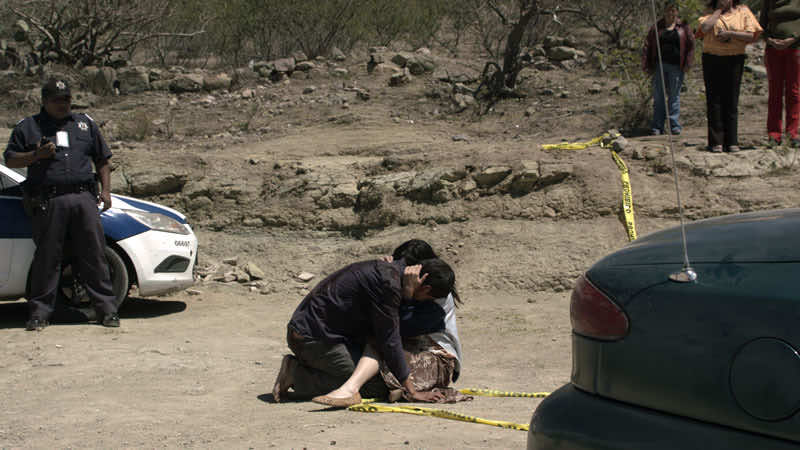 They do not see why that should be seen outside of Mexico or why to make a film about that. That’s what I’ve encountered in the States. But many people have liked it too, it’s shown in several festivals, and I just showed it at a University in California, and the reactions have been very favorable, to save a few of people who get angry and feel attacked by the sheer force of the film. I’ve seen that reaction abroad a lot, but less so in Mexico because in Mexico, the film came out of Cannes labeled as an extremely violent movie. But people in Mexico have been able to see beyond that, and I think a lot of people in the States will be able to see that too and that they’ll like the film because of the story it tells and because of the characters.
They do not see why that should be seen outside of Mexico or why to make a film about that. That’s what I’ve encountered in the States. But many people have liked it too, it’s shown in several festivals, and I just showed it at a University in California, and the reactions have been very favorable, to save a few of people who get angry and feel attacked by the sheer force of the film. I’ve seen that reaction abroad a lot, but less so in Mexico because in Mexico, the film came out of Cannes labeled as an extremely violent movie. But people in Mexico have been able to see beyond that, and I think a lot of people in the States will be able to see that too and that they’ll like the film because of the story it tells and because of the characters.
Why do you think the reaction to the violence in Heli has been so visceral?
I think it’s because of how I show violence. I think that we are used to seeing people die in the big screen. It’s the most common thing when you go to the movies that somebody dies or somebody gets killed; that’s what’s normal. If you think about it, it’s rare when you go to the movies and somebody doesn’t die. Out of 10 movies maybe there’s one where nobody dies. The most normal is that people get killed on screen. For example, in Batman Dark Knight about 15 people get killed in the first five to 10 minutes. But there is a way of showing death that people are used to, but when you show it in a different way, as if you were sitting right there without diversions, it’s different. I didn’t want to make violent scenes that were sexy, or dynamic or cinematic. I wanted to make those scenes un-cinematic. 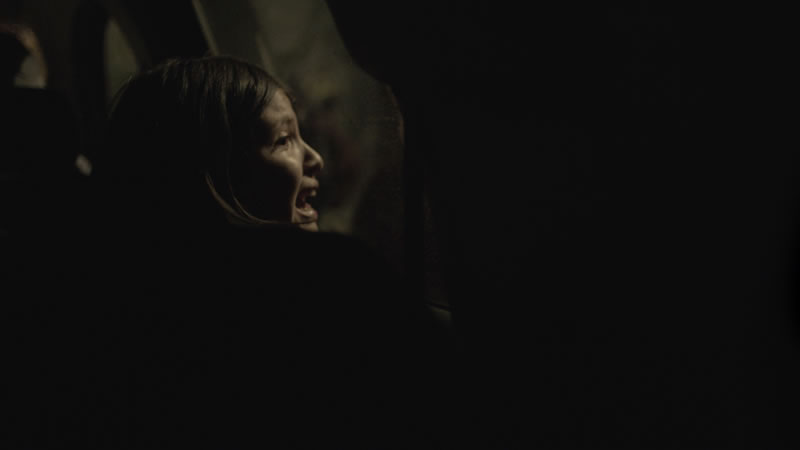 For me, cinematic has to do with editing and camera movements but those scenes are shot in an “anti” cinematic way, “anti-Hollywood” let’s say. That’s why people have a bad reaction to it. In a similar way, people are not used to seeing the acting style shown in my film and react poorly to it. For instance, in Mexico, people can watch a lot of telenovelas and never complain about the acting, but to me that acting is completely false and not credible, but when they watch my movie they complain about the acting because they are not like in a telenovela. People have already been so programmed in the way they watch something that they can be upset when they’re shown something that’s not within the parameters they expect it to be. Not everybody, obviously, but when people are very set in a way and a movie breaks with that there might be a clash sometimes. But this is also why this movie is so powerful. It is outside of the way in which we normally see things.
For me, cinematic has to do with editing and camera movements but those scenes are shot in an “anti” cinematic way, “anti-Hollywood” let’s say. That’s why people have a bad reaction to it. In a similar way, people are not used to seeing the acting style shown in my film and react poorly to it. For instance, in Mexico, people can watch a lot of telenovelas and never complain about the acting, but to me that acting is completely false and not credible, but when they watch my movie they complain about the acting because they are not like in a telenovela. People have already been so programmed in the way they watch something that they can be upset when they’re shown something that’s not within the parameters they expect it to be. Not everybody, obviously, but when people are very set in a way and a movie breaks with that there might be a clash sometimes. But this is also why this movie is so powerful. It is outside of the way in which we normally see things.
How did you prepare for this film in terms of research, raising funds and pre-production?
It took about four years to raise the funds to make this film. Normally, one would take about two years to get money for an independent film. In that time, I was also writing the script with the other screenplay writer Gabriel Reyes and searching for the cast. We did not do research. Rather, we are very observant. I think of myself as someone who listens and is very sensitive. Everything that is in the film is known in Mexico. For instance, that scene with the DEA officer was taken from a YouTube video that I think you can still get if you look up “cops in León Guanajuato torture another cop.” Everyone knows that it happens, and I’m not revealing anything 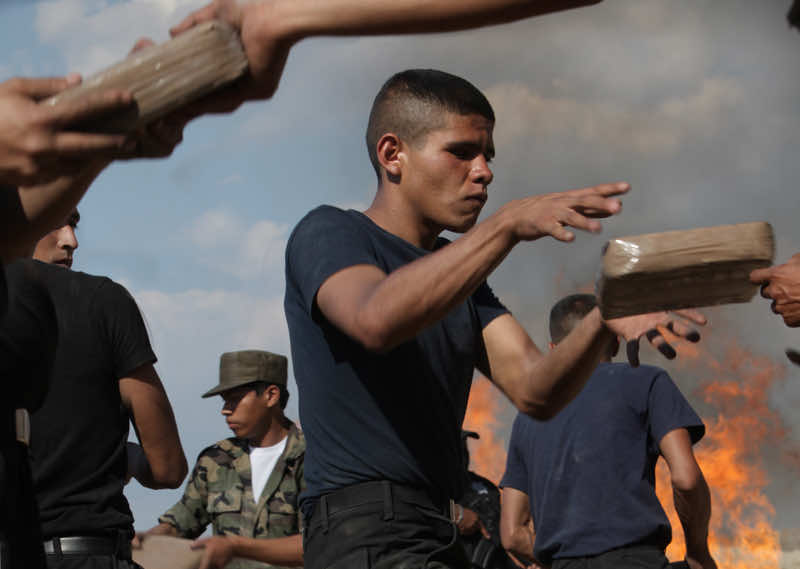 that I had to go and look for. We are just simply connecting the dots. There are some things in the film that we took directly from the newspapers and some situations we took directly from real life, and from there we started to construct a story. It was not necessary to do research because everything in the film is taken from the public domain. I wanted to go a different route, not research, but showing humanity and sensibility. That’s also how we did the casting. We got people that are from that area, live there, and could be in that situation in some way. The cast bring with them a lot of the context and the reality that adds to the authenticity of the film. We also changed some of the dialogue to fit the way in which they would say something.
that I had to go and look for. We are just simply connecting the dots. There are some things in the film that we took directly from the newspapers and some situations we took directly from real life, and from there we started to construct a story. It was not necessary to do research because everything in the film is taken from the public domain. I wanted to go a different route, not research, but showing humanity and sensibility. That’s also how we did the casting. We got people that are from that area, live there, and could be in that situation in some way. The cast bring with them a lot of the context and the reality that adds to the authenticity of the film. We also changed some of the dialogue to fit the way in which they would say something.
How did you carry out the casting? Are they all non-actors?
Yes, they are all from that region, except for the main actor, who is from Mexico City and was going to acting school when we cast him. My brother, Martín [Escalante], found everyone in the street including the girl and the detective. I interviewed them, took photos and started to get to know them, and that’s how I knew they were right for the part. None of them, except for the main character, had acting experience.
How do you think the drug conflict will evolve?
I live in Mexico and love my country. That’s probably why I made the film, out of concern. I think people with a lot of power in Mexico— that’s just a handful of people— are interested in having this ongoing violence and corruption. I think that it is something relatively easy to eradicate if people really wanted to, but there’s a lot of people that are doing fine with corruption and violence. I don’t mean common people but the top echelons, even from the United States. The conflict is making a lot of people rich. The war against drugs could go another way, drugs could be legalized or something like that to stop the assassination and extortion of so many people. 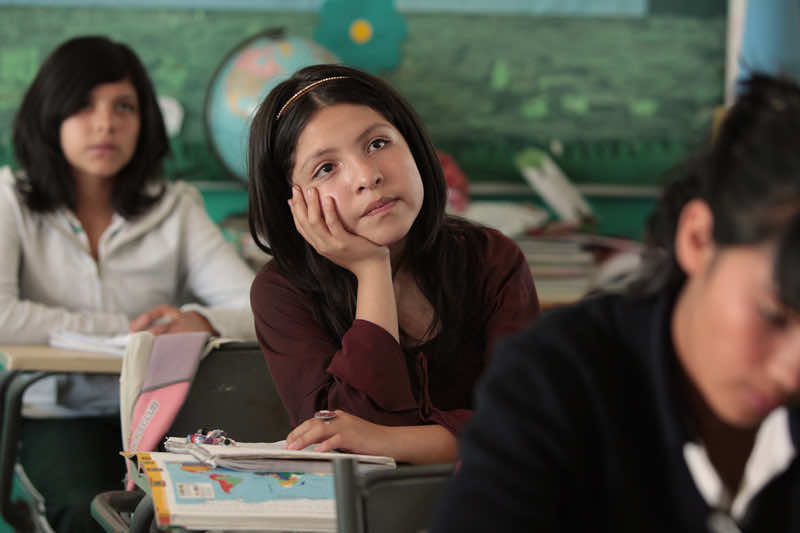 Those options simply do not exist because people with power are not interested in things really getting better. I don’t think a movie can really create a change, but I think that it’s important to reflect on the problems in the country. It’s important that we look at our own problems and that we let other people see them as well, and that gets you closer to a change. For instance, when you are sick, the first thing you do is go and tell someone else or show someone where it hurts. I think Mexico has a virus that affects certain parts of the country, or certain sectors of society, and through talking about it we can start to advance. The movie is also about young people, the new generation; that’s where I think hope lies, but we as a society need to look after those young people and those babies through education and care and not abandon them like so many people have been abandoned in Mexico. For example, the girl in the movie that has a baby at 13, the 6-month-old baby that appears in the film was born to a 14-year-old mother. This is not common, but it’s something more or less common in Guanajuato. That situation is related to education and all that. What that child that was born from a 14-year-old mother will become, it’s likely that he will end up doing something not morally correct.
Those options simply do not exist because people with power are not interested in things really getting better. I don’t think a movie can really create a change, but I think that it’s important to reflect on the problems in the country. It’s important that we look at our own problems and that we let other people see them as well, and that gets you closer to a change. For instance, when you are sick, the first thing you do is go and tell someone else or show someone where it hurts. I think Mexico has a virus that affects certain parts of the country, or certain sectors of society, and through talking about it we can start to advance. The movie is also about young people, the new generation; that’s where I think hope lies, but we as a society need to look after those young people and those babies through education and care and not abandon them like so many people have been abandoned in Mexico. For example, the girl in the movie that has a baby at 13, the 6-month-old baby that appears in the film was born to a 14-year-old mother. This is not common, but it’s something more or less common in Guanajuato. That situation is related to education and all that. What that child that was born from a 14-year-old mother will become, it’s likely that he will end up doing something not morally correct.
Heli opens this Friday, May 30, in South Florida at the Miami Beach Cinematheque, Bill Cosford Cinema and the Tower Theater. Program Note: Independent Ethos critics Ana and Hans Morgenstern will introduce Heli on opening night, this Friday, at the Miami Beach Cinematheque, at 9:15 p.m. and again Saturday, at 7 p.m. Let us know if you will be there by signing up on our Facebook event page. For screening dates in other parts of the U.S., visit the film’s official website here.
Update: Heli is also showing in Broward County Friday and Saturday only at the Cinema Paradiso in Fort Lauderdale and Hollywood … if you absolutely can’t come see in Miami Beach.









